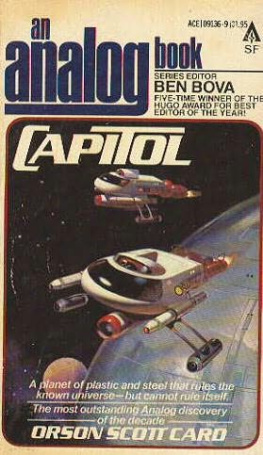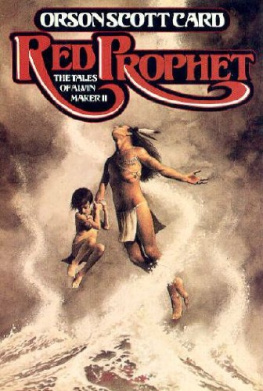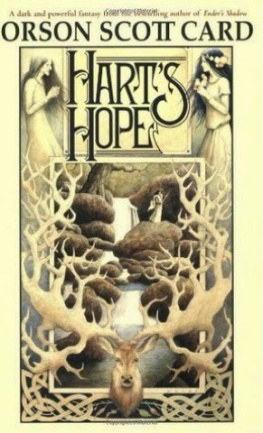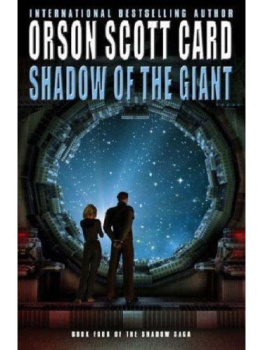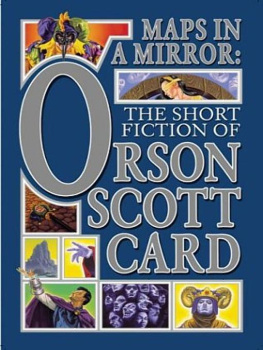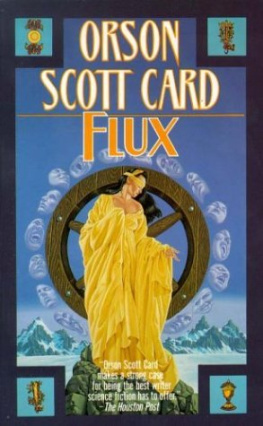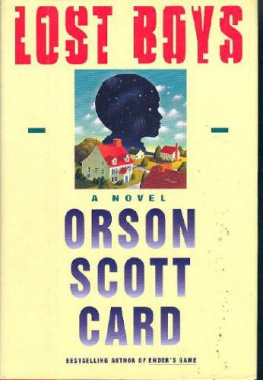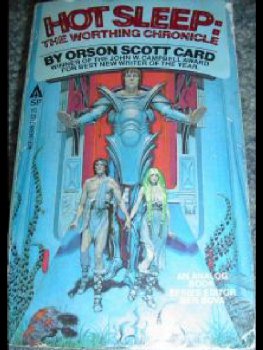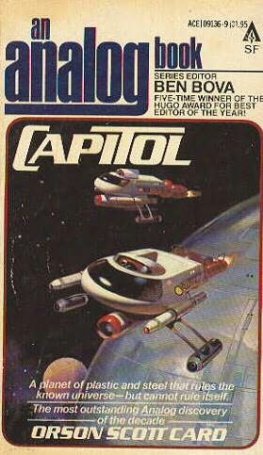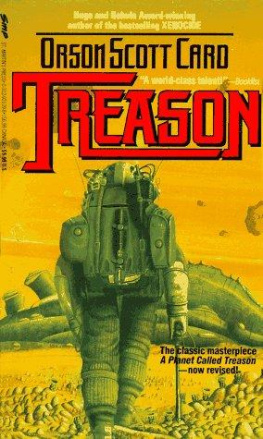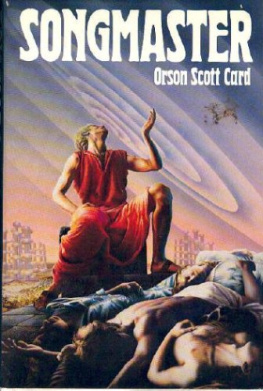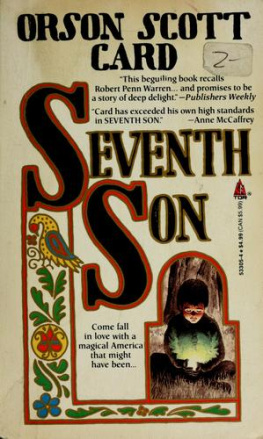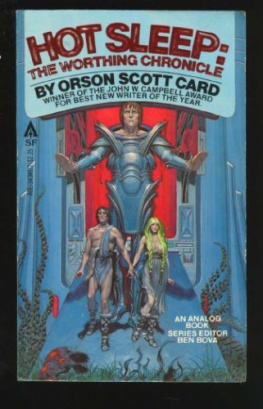Orson Scott Card
Capitol
To Jay A. Perry,
Who has read everything and made it better
Preface
Fiction usually does a better job standing on its own, but occasionally a word of explanation can help a reader receive a work as the author means to give it.
Capitol is not a novel; however, it is also not a short story collection. While all the stories in Capitol are completely self-contained, they are placed in the book in chronological order, to gradually unfold the biography of a world and a way of life that is born in "A Steep and a Forgetting" and dies in "The Stars That Blink. " I urge you to read them in order.
Also, Capitol overlaps in time and some characters with Hot Sleep, which is a novel, and which is soon to appear, like Capitol, as an Analog Book. Together, they comprise what is now extant of The Worthing Chronicle.
A SLEEP AND A FORGETTING
There is no remembrance of former things; neither shall there be any remembrance of things that are to come with those that shall come after.
-- Ecclesiastes 1:11
There was nothing remarkable about a rat failing to run a maze. What was remarkable was that five rats ran the maze perfectly-- and five did not.
"My Lord," whispered George Rines.
"Run it again?" asked Vaughn Shirten, the lab assistant who tended the rats.
"Of course."
The five rats who had failed before failed again. The others ran the maze perfectly.
"Vaughn, do you have five rats that have never run a maze at all?"
"Rats of every kind. Smart, stupid, and psychologically virgin." He brought five virgins from the ratroom and put them in their first maze. There was no significant difference between the performance of the virgins and the five rats who had failed to run the maze before.
"My God," whispered George Rines. "What have we done?"
"Made rive smart rats stupid, looks like."
Two days before, all ten rats had run the maze perfectly. They had been divided randomly into two groups. Five of the rats were then given a drug; a day later they were given another. Those were the five that had forgotten how to run the maze.
"I'm not worried about the rats," George said.
"I am," said Vaughn.
"We've been giving that drug to people."
Vaughn looked at him blankly. "People? A stupid drug? Who needs a drug to make people stupid?"
"Somec, Vaughn. Somec."
It was Vaughn's turn to look shocked. "I thought they tested that!"
"All the tests but this one, Vaughn."
"But-- haven't they woken up any of the people who've gone on somec?"
"Not yet." George smiled wanly. "They all had cancer. They didn't want to be wakened until there was a cure."
"Somec." Vaughn laughed. "Some miracle drug!"
"It isn't funny," George said.
* * *
"You signed a contract," Dr. Tell insisted. "You can't publish without my consent."
George shook his head. "I can't publish scholarly papers. So if you won't let me take it to fellow scientists, I'll take it to the press. They'll print the story."
Tell glared; restrained himself from shouting; said, "You bastard. You would."
"It isn't enough just to stop authorizing it. The formula is public knowledge-- what's to stop some grad student from whipping it up in his lab for a friend? Even the life support isn't hard to arrange."
"You don't seem to understand." Slowly, carefully. The smile that had launched a thousand research projects made a struggle to appear on his face. It failed. "There is more at stake than somec."
George closed his eyes.
"There's a thing called independent research. We checked everything. We were so careful, George. We even did rat tests. Gave somec to some rats, not to others, and then taught them both mazes. There was no effect. How were we to know that somec impaired memory?"
"It doesn't impair, Dr. Tell. It eliminates."
"You don't know that."
"I'm pretty damn sure."
"Pretty damn isn't sure enough, George. There's that jackass of a senator who'll stand up and piously denounce federally funded projects that make basket cases out of people who already have problems. He'll do it, you know, and that'll mean funds cut off from everything."
"So what will you do, pretend everything's all right? They're not that far from curing some types of cancer now, and when they can fix it they'll wake up the sleepers who have that cancer and they'll find that they're vegetables."
"I don't know what we're going to do yet!" Dr. Tell shouted.
"We're going to warn the public."
"We're going to keep it quiet until we know what we're going to do."
"And when will that be?"
"I don't know."
George stood up. "I didn't think so. I know, Dr. Tell. It'd be nice to tell the press, there was a disaster, but this is how we're going to solve it in the future. But we can't do that, can we? So we're going to warn people, and warn them now, that somec does exactly what we've claimed it does, with one side effect. It wipes out memory."
"Dammit, George, we don't know that!"
"We suspect it. That's enough."
"If you do this, George, I can promise you that you'll never have a research or teaching job in the United States of America. Or Britain. Or anywhere!"
"In five years there'll be Russian troops all over America and none of us will have teaching jobs except those of us who know what we're doing in a laboratory. No more fund-raising experts, Dr. Tell. So I'm really not worried about your threat."
"And if the Russians don't come, Cassandra?"
"I will have saved some lives."
"'You're out for headlines, you bastard, if it destroys American science in the process! You want to be a crusader! You want to--"
The door slammed, and George didn't hear the rest of the speech. In a way, he knew Dr. Tell was right. George's own first impulse was to keep his discovery silent. He had wrestled with the problem all night, had hardly slept, but he decided at about four a.m. that he really had no choice. Either he could be the crusader who was hated by other scientists, or he could be one of the bastards who hushed it up, hated by the rest of the world. The rest of the world was bigger. And none of the scientists would be left mindless.
He returned to his office to clean out his desk and load his books into boxes. The reporters would be meeting him at his home in three hours. There was no point in pretending to stay at the Institute. His letter of resignation was already on the Director's desk. It was, almost a formality, telling Dr. Tell. But he was the man who was supervising the whole somec project-- he had to know.
I feel like a murderer. So much hope for somec. But is it my fault? No. We were too excited. We thought we had tested everything. We deserve to be punished for acting too quickly, too unthoroughly.
Punished? George frowned at the thought. Not a matter of punishment or guilt or anything. Just stop the somec and find a way to get around the problem.
When he pulled the Scientific Americans off the shelf, they scattered in every direction. There were quite a few of them, most of the recent ones dogeared where he meant to read an article sometime soon. It was the only way he had to keep up on fields other than his own.
Perhaps in order to avoid thinking about the announcement he was going to make to the reporters in a couple of hours, or perhaps because moving out of the office was so distasteful to him, George picked up the top magazine and opened it to the first dog-eared page. He skimmed; read two more articles; then opened another magazine. Braintaping was the title of the first article he turned to; "Instantaneous teaching by establishing currents in the brain? It may be within reach." It intrigued George enough to lead him into the magazine. And what he found there meant that he wouldn't pack up after all.
Next page
